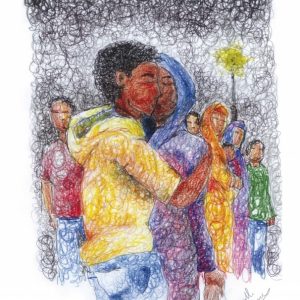
Story:
Happy endings are hard to come by on the island of Lamepedusa. For one thing, even the migrants who survive the journey to this tiny island gateway to Europe have a long way to go before they reach anything that could be described as a “happy ending.” Nevertheless, there are glimmers of hope. The kiss of this young couple radiates both relief and hope. “We made it!” it exclaims. Hope—like the island of Lampedusa itself—persists in a sea of suffering.
Bible Reading: Exodus 23:9
Empathy is the ability to understand and share the feelings of another. God is counting on both empathy and memory to reinforce this command in Exodus 23:9: “You shall not oppress a stranger, for you know the feelings of the stranger, having yourselves been strangers in the land of Egypt” (JPS).
God’s appeal must have had a powerful impact on the newly liberated covenant people. One wonders if it could have a similar impact on many of us.
Consider, for instance, this statistic: In the years between 1892 and 1954, approximately 12 million immigrants passed through the immigrant inspection station on Ellis Island. Were your ancestors among them? Mine were. I can’t help but wonder if my great-great-great grandparents shared a kiss of hope like the one in the picture.
Discussion/Reflection:
- Were your ancestors immigrants? If so, how does that affect the way you view contemporary migrants?
- What does it feel like to be a stranger in a strange land? To what degree can empathy and memory help us engage the contemporary conversation around migrants and refugees?
Action:
- Research your own family’s story.
- Read more about the island of Lampedusa in this March 26, 2019 editorial: A Look from the Border.
Prayer: Forgive us for our short memories. Forgive us for our lack of empathy. Forgive us when we are quick to accept God’s grace for ourselves, but slow to show grace to others.
Welcoming the Stranger Series
In the last ten years more than 35,000 asylum seekers have died in the Mediterranean. Desperate to escape untenable situations in countries like, Syria, Eritrea, Sudan, and Somalia, refugees risk both life and livelihood to board rickety boats bound for what they hope will be a new life in Europe. Many of them die within sight of what they hoped would be the promised land.
Welcoming the Stranger is a devotional series designed to help Christians connect this unfolding humanitarian crisis in the Mediterranean with the Bible’s call to “welcome the stranger.” Recognizing that “the stranger” can sometimes be an abstraction that blinds us to the face of Christ, the series approaches the refugee crisis from a personal perspective. Each entry focuses on one person’s story, brought vividly to life by Italian artist and relief worker, Francesco Piobbichi. These stories are then linked to relevant Scripture, prayer, discussion, and action prompts.
Immigration is a hot topic around the globe, and the Bible passages in this series speak to wherever we are called to “welcome the stranger.” My specific interest in the Mediterranean context was sparked by a 2016 trip to the island of Lampedusa—a small island off the coast of Sicily that is the scene of so much hope and tragedy for refugees trying to enter Europe via small, unsafe boats. In addition learning about the situation there and the work being done by ecumenical groups like Mediterranean Hope, I spent significant time interviewing Francesco Piobbichi, whose art documents the stories of individual refugees and families who often die trying to reach safety. You can learn more about him and work through the following link: Francesco Piobbichi’s Artwork Each of his “snapshots” tells a story—sometimes of triumph, but often of tragedy: Piobbichi’s goal is to help people understand this large-scale human tragedy on a more personal level. My goal in this series is to use Piobbichi’s art as a starting point for Bible study and personal reflection/action.
